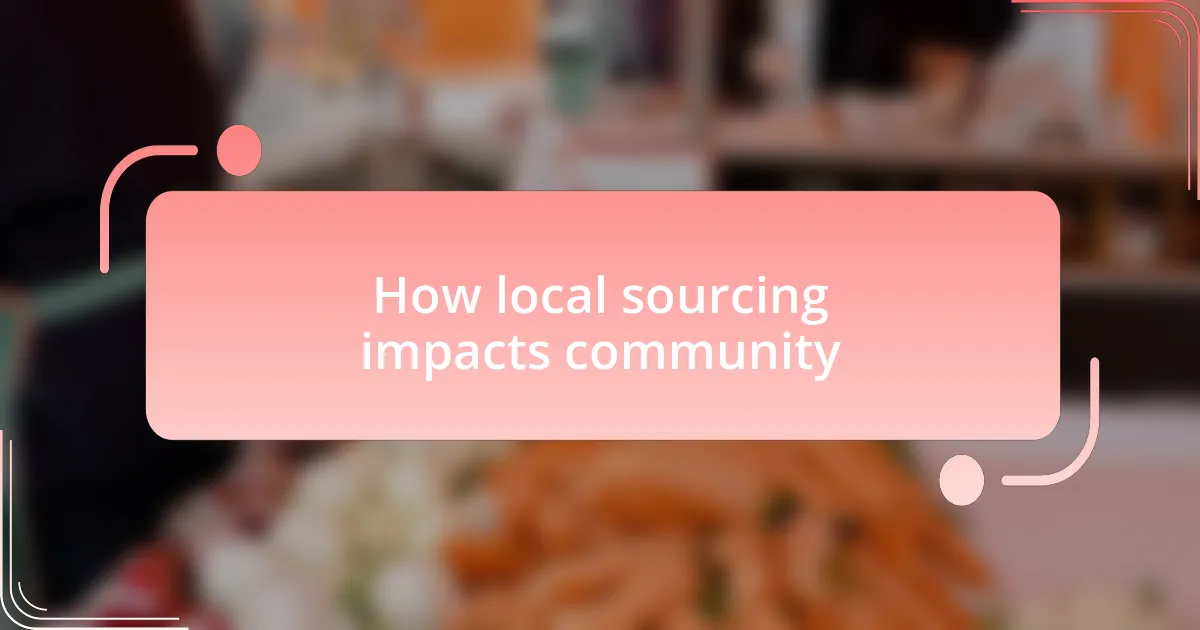Key takeaways:
- Ethical marketplaces prioritize sustainability, transparency, and community support, transforming consumer choices into impactful decisions for local artisans and businesses.
- Local sourcing enhances the economy by supporting small businesses, building personal connections, and reducing environmental impact through minimized transportation.
- Challenges of local sourcing include product availability, price disparities, and logistical complexities, requiring consumers to balance ethical considerations with practicality.
- Local sourcing fosters community connection, encourages creativity, and cultivates pride, reinforcing the significance of supporting local producers in our neighborhoods.

Understanding ethical marketplaces
Ethical marketplaces prioritize values like sustainability, transparency, and community support over mere profit. When I first began shopping consciously, I was surprised to discover how many small businesses were dedicated to fair trade practices. Have you ever thought about the story behind the products you choose? It’s eye-opening to learn that each purchase can support an artisan’s livelihood instead of just filling a corporate pocket.
These marketplaces often create a sense of community, connecting consumers directly with producers. I remember visiting a local craft fair and chatting with artisans about their methods and materials. Their passion was infectious, and it made me realize that my buying choices could actively support my neighbors’ crafts and dreams.
In understanding ethical marketplaces, it’s crucial to recognize the impact of our choices. Each purchase I make carries weight; it isn’t just about acquiring an item, but also supporting ethical practices that foster fairness and respect. When we shift our focus to local sourcing, we begin to see how interconnected we are, and it can truly transform the way we think about consumption.

Importance of local sourcing
Local sourcing plays a vital role in supporting small businesses within our communities. I vividly recall my first experience buying fresh produce from a farmer’s market. Not only did the fruits taste better, but knowing that my purchase would help a family’s local farm thrive made the experience incredibly rewarding. Have you ever tasted a tomato so fresh that it brought back childhood memories of summer?
When we prioritize local sourcing, we contribute to a more sustainable economy. I’ve noticed how choosing local products reduces the carbon footprint associated with transportation. Walking through my neighborhood’s artisan shops, I can see firsthand how these businesses often use eco-friendly practices, which resonate deeply with my values. Isn’t it fascinating how a simple choice can ripple out and create positive change?
Moreover, local sourcing fosters a sense of trust and connection. The relationships I’ve built with local vendors enrich my shopping experience. When I discuss a product’s origins or ask for recommendations, it feels like I’m having a genuine conversation rather than a transactional exchange. Doesn’t it make you feel good to know that your support helps your community flourish?

Benefits of supporting local businesses
When I think about supporting local businesses, it’s hard not to appreciate the unique character they bring to our communities. I remember wandering through a quaint bookstore where the owner shared her passion for literature and her journey in curating each title on the shelves. It transformed a simple shopping trip into an enriching experience, reminding me how much more we gain when we support small enterprises. Doesn’t it energize you to discover those hidden gems that truly reflect our local culture?
In addition to the personal connection, purchasing from local businesses can significantly boost our local economy. I’ve seen the ripple effects firsthand: every dollar spent locally circulates within the community multiple times, ultimately creating jobs and encouraging new ventures. It’s fascinating to realize that by choosing to shop at a local craft fair instead of a big-box store, we’re actively investing in our neighborhood’s future. Isn’t it powerful to think that our choices can spark growth right outside our door?
Moreover, there’s a certain joy that comes from knowing our purchases create a positive impact. Recently, I attended a community-supported agriculture (CSA) program that not only provided me with fresh, seasonal produce but also supported local farms directly. I left with a sense of purpose, feeling that I was part of something bigger—nourishing my family while helping farmers sustain their livelihoods. Have you ever felt that exhilarating sense of connection when you know your efforts contribute immediately to someone else’s dreams?

Challenges in local sourcing
Local sourcing certainly comes with its own set of challenges. One significant hurdle I’ve faced is the limited availability of certain products. I once sought out a local supplier for specialty spices to enhance my cooking. Despite my best efforts, I found that many options were only available through large distributors, leaving me frustrated. Have you ever felt that tug-of-war between wanting the best and acknowledging the reality of what’s accessible?
Another challenge I’ve encountered is the price disparity that often exists in local markets. While I fully recognize the need to support local businesses, there are times when I had to weigh my budget against my values. For instance, I recall the time I chose to buy organic vegetables from a farmer’s market instead of a supermarket. The quality was unmatched, but my wallet felt the pinch. Does anyone else grapple with this balance of ethical spending versus everyday practicality?
Finally, coordinating with multiple local suppliers can be quite a task. I learned this firsthand while trying to craft a local, sustainable gift basket. Juggling communications with each artisan was both exciting and exhausting. There were times I wished for the convenience of a one-stop shop! Have you found that sometimes, the charm of local sourcing can also lead to logistical headaches?

Lessons learned from local sourcing
One of the most valuable lessons I’ve learned from local sourcing is the deep connection it fosters with the community. I remember attending a local craft fair where I met a potter who shared the story behind each piece she created. It was eye-opening to realize that every purchase I made not only supported her livelihood but also cultivated a sense of belonging within the community. Have you ever considered how your shopping habits can bring people together in such a tangible way?
Another significant insight I’ve gained is the importance of quality over quantity. When I chose to source ingredients from a nearby farm for a dinner party, the flavor of those fresh tomatoes was breathtaking compared to anything I’d bought at a chain store. This experience reaffirmed my belief that local products often come with a level of care and craftsmanship that’s simply unmatched. Have you tasted the difference that fresh, locally-sourced foods can make in your meals?
Lastly, I’ve discovered that local sourcing often encourages creativity and adaptability. While planning a family gathering, I was on the lookout for unique, local wines. The limited selection led me to experiment with pairings I wouldn’t have otherwise considered. This not only added excitement to the meal but also sparked delightful conversations among guests. Have you ever found that stepping outside your comfort zone brought unexpected joy?

How local sourcing impacts community
Local sourcing can significantly uplift the community by creating a supportive network among local businesses. I remember walking into a small bakery where the owner shared how sourcing ingredients from nearby farms not only enhanced her products but also strengthened her relationships with those farmers. I couldn’t help but think about how this interconnectedness fosters trust and collaboration, making the entire community more resilient.
Moreover, local sourcing often leads to increased employment opportunities. During my visit to a local art fair, I spoke to an artisan who had hired several people from the neighborhood, contributing to their livelihood. It made me appreciate how every dollar spent in the local market echoes back into the community, providing jobs and supporting families. Have you ever thought about how your shopping choices can directly impact someone’s life?
Finally, supporting local businesses through sourcing cultivates a sense of pride within the community. I once hosted a potluck where all the dishes were made with local ingredients, and the contagious enthusiasm around the table was palpable. Everyone shared their favorite places to shop and stories about the producers, creating a rich tapestry of connections. Have you felt that same energy when you celebrate local flavors with friends?